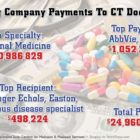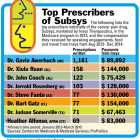I-Team In-Depth
Disclosure Rules Don’t Stem Flow Of Pharma Cash To State’s Doctors
|
Dozens of Connecticut doctors accepted six-figure payments from drug and medical device manufacturers in 2015 for consulting, speaking, meals and travel, with six of the 10 highest-paid physicians affiliated with academic institutions, new federal data show. The top 10 doctors – less than 0.1 percent of the 11,000 who received payments – took in $3.6 million, or nearly 15 percent of the total $24.9 million paid out. Among them is the dean of the Yale School of Medicine, Dr. Robert Alpern, who received $445,398 in 2015 from two companies – Abbott Laboratories and AbbVie – in consulting fees, meals and travel expenses for serving on the boards of both companies. In 2014, he received $458,194 from the two companies. The Yale medical school began a research partnership with AbbVie in 2013, after the pharmaceutical company spun off from Abbott Laboratories.

